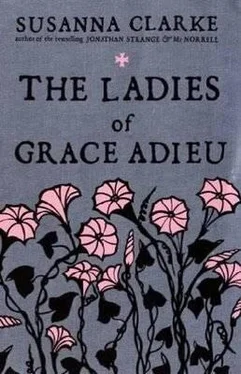The fairy bridge at Thoresby did not, in and of itself, bring prosperity to the town, for Mr Winstanley still neglected to do any thing that might have made money for himself or the townspeople. However two years after Tom and David's visit, Mr Winstanley was shewing the bridge to some visitors when, very mysteriously, part of the parapet was seen to move and Mr Winstanley fell into the river and drowned. His lands, clay and coal all became the possessions of his baby son, Lucius. Under the energetic direction first of Mrs Winstanley and later of Lucius himself the lands were improved, the clay was dug up, and the coal was mined. Pewley Witts had the handling of a great deal of the business which went forward and grew very rich. Unfortunately this did not suit him. The dull satisfaction of being rich himself was nothing to the vivid pleasure he had drawn from contemplating the misery and degradation of his friends and neighbours.
And so nothing remains but to make a few observations upon the character of Lucius Winstanley. I dare say the reader will not be particularly surprized to learn that he was a most unusual person, quite extraordinarily handsome and possessed of a highly peculiar temper. He behaved more like Thoresby's king than its chief landowner and ruled over the townspeople with a mixture of unreliable charm, exhausting capriciousness and absolute tyranny which would have been entirely familiar to any one at all acquainted with Tom Brightwind.
He had besides some quite remarkable talents. In the journal of a clergyman we find an entry for the summer of 1806. It describes how he and his companion arrived at Thoresby Bridge (as the town was now called) on horseback and found the town so still, so eerily silent that they could only suppose that every creature in the place must be either dead or gone away. In the yard of The New Bridge Inn the clergyman found an ostler and asked him why the town was as quiet as any tomb.
"Oh!" said the ostler. "Speak more softly if you please sir. Lucius Winstanley, a very noble and learned gentleman – you may see his house just yonder – was drunk last night and has a head ach. On mornings after he has been drinking he forbids the birds to sing, the horses to bray and the dogs to bark. The pigs must eat quietly. The wind must take care not to rustle the leaves and the river must flow smoothly in its bed and not make a sound."
The English clergyman noted in his journal, "… the entire town seems possessed of the same strange mania. All the inhabitants go in awe of Mr Lucius Winstanley. They believe he can work wonders and does so almost every hour." [11]
But though the people of Thoresby Bridge were proud of Lucius, he made them uncomfortable. Around the middle of the nineteenth century they were forced to admit to themselves that there was something a little odd about him; although forty or so years had passed since his thirtieth birthday he did not appear to have aged a single day. As for Lucius himself it was inevitable that he should eventually get bored of Thoresby even if he did enliven it for himself by having great ladies fall in love with him, changing the weather to suit his moods and – as once he did -making all the cats and dogs talk perfect English while the townspeople could only mew and bark at each other.
On a spring morning in 1852 Lucius got on his horse, rode on to his father's bridge and was never seen again.
In the spring of 1568 Mary, Queen of Scots, fearing the wrath of her subjects, crossed the border into England. Once arrived, she wrote a letter to her cousin, Queen Elizabeth, explaining her predicament and begging for her protection. Elizabeth wrote back, expressing her shock that subjects should behave so wickedly towards their lawful and divinely appointed Prince. But privately she considered how Mary had often laid claim to the English throne. She also thought how Mary had had a most baleful influence upon her Scottish subjects, how she had been an instigator of civil wars and the cause of several murders.
With many regrets, Elizabeth cast the Queen of Scots into prison for the rest of her life.
The Queen of Scots was given into the care of the Earl of Shrewsbury, a quiet gentleman of moderate abilities who was remarkable for two things – his vast wealth and his wife, a lady who was greatly esteemed by Queen Elizabeth. The Earl brought the Queen of Scots to Tutbury Castle, an ancient grey tower on the borders of Derbyshire and Staffordshire.
From the roof of this castle she looked down. Once she had laid claim to three thrones; now her world was shrunk to this view of a muddy ditch and a dark hillside.
How had this happened? In the royal courts of Europe her fall had been a matter of common prediction for many years. Her decisions had been catastrophic, her love affairs scandalous. She had been a comet; and her blazing descent through dark skies had been plain for all to see. But the Queen herself was amazed at this sudden change in her fortunes – amazed and very much inclined to blame someone.
Elizabeth, she thought, had done this to her. Elizabeth and England. The Queen gazed about her at the gloomy winter landscape. The pallor of the sky seemed to her to be Elizabeth 's white complexion. The chill wind on her cheek was Elizabeth 's breath. The glint of a river seen through winter trees was the bright spark of malice in Elizabeth 's eye.
The Queen of Scots felt she had dwindled, until she was nothing more than a flea upon Elizabeth 's body or, at best, a mouse in the hem of her gown. With a wail the Queen cast herself down and began to weep and to beat her hands on the stones. The soldiers who guarded her were amazed to witness such behaviour, but her French and Scottish attendants were not much disturbed. They had seen it all before.
They carried her to her chamber and laid her upon the bed. Her lady-in-waiting, Mrs Seton, sat down beside her and tried to distract her with gossip.
Mrs Seton told her how the Earl and Countess of Shrewsbury, though both middle-aged, had not been married long. She said that the Countess had not been born into any great family, indeed that she was scarcely more than a farmer's daughter, but had achieved her present rank by marrying four husbands, each richer and greater than the one before.
"Quatre maris!" exclaimed the Queen of Scots, whose first language was French. "Mais elle a des yeux de pourceau!" (Four husbands! But she has piggy-eyes!)
Mrs Seton laughed in agreement.
Four husbands! thought the Queen of Scots. And the first three dying in so convenient a manner! – just when the farmer's daughter had grown into her new rank and might be wishing for a greater. The Queen of Scots's husbands had never consulted her convenience in their dying. Her first, the King of France, had died at the age of sixteen and so she had lost the French throne – a circumstance that had caused her great pain. Her second husband (whom she had hated and wished dead) had fallen ill in the most tantalising way, but had utterly failed to die – until some kind person had first blown him up and then strangled him.
This suggested an idea to the Queen of Scots. "Did the Countess's husbands all die naturally?" she asked.
Mrs Seton snorted in ridicule and leant closer. "Her first husband was no more than a boy! The Countess – who was only plain Bess Hardwick then – embroidered him a coat all chequered over with black and white squares. And, after he had worn it a few times, he began to complain that the whole world had become to him nothing but black and white squares. Every dark tabletop seemed to him a gaping black hole that meant to swallow him up and every window filled with white winter light was ghostly to him and full of malicious intent. And so he died, raving about it."
Читать дальше












